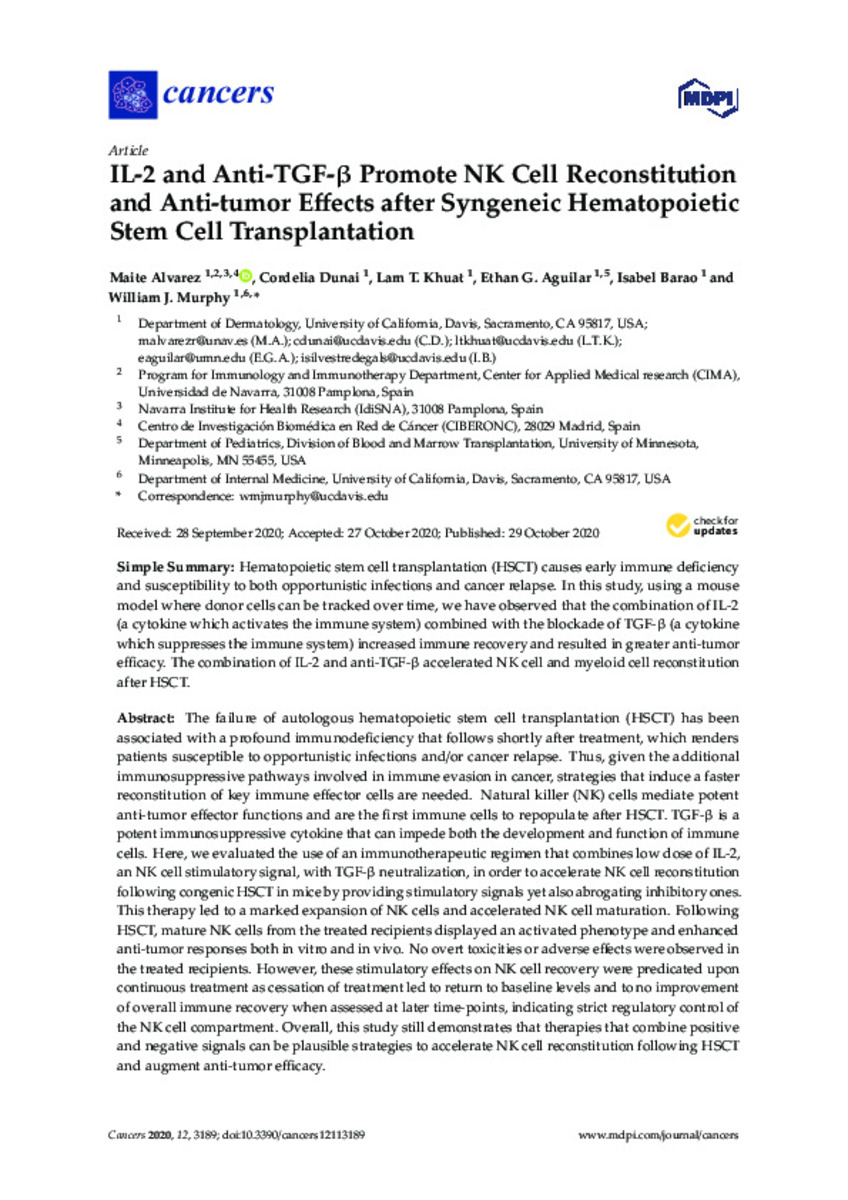Full metadata record
| DC Field | Value | Language |
|---|---|---|
| dc.creator | Álvarez, M. (Maite) | - |
| dc.creator | Dunai, C. (Cordelia) | - |
| dc.creator | Khuat, L.T. (Lam T.) | - |
| dc.creator | Aguilar, E.G. (Ethan G.) | - |
| dc.creator | Barao, I. (Isabel) | - |
| dc.creator | Murphy, W.J. (William J.) | - |
| dc.date.accessioned | 2023-05-23T09:58:03Z | - |
| dc.date.available | 2023-05-23T09:58:03Z | - |
| dc.date.issued | 2020 | - |
| dc.identifier.citation | Álvarez, M. (Maite); Dunai, C. (Cordelia); Khuat, L.T. (Lam T.); et al. "IL-2 and Anti-TGF-β Promote NK Cell Reconstitution and Anti-tumor Effects after Syngeneic Hematopoietic Stem Cell Transplantation". Cancers. 12 (11), 2020, 3189 | es_ES |
| dc.identifier.uri | https://hdl.handle.net/10171/66341 | - |
| dc.description.abstract | The failure of autologous hematopoietic stem cell transplantation (HSCT) has been associated with a profound immunodeficiency that follows shortly after treatment, which renders patients susceptible to opportunistic infections and/or cancer relapse. Thus, given the additional immunosuppressive pathways involved in immune evasion in cancer, strategies that induce a faster reconstitution of key immune effector cells are needed. Natural killer (NK) cells mediate potent anti-tumor effector functions and are the first immune cells to repopulate after HSCT. TGF-β is a potent immunosuppressive cytokine that can impede both the development and function of immune cells. Here, we evaluated the use of an immunotherapeutic regimen that combines low dose of IL-2, an NK cell stimulatory signal, with TGF-β neutralization, in order to accelerate NK cell reconstitution following congenic HSCT in mice by providing stimulatory signals yet also abrogating inhibitory ones. This therapy led to a marked expansion of NK cells and accelerated NK cell maturation. Following HSCT, mature NK cells from the treated recipients displayed an activated phenotype and enhanced anti-tumor responses both in vitro and in vivo. No overt toxicities or adverse effects were observed in the treated recipients. However, these stimulatory effects on NK cell recovery were predicated upon continuous treatment as cessation of treatment led to return to baseline levels and to no improvement of overall immune recovery when assessed at later time-points, indicating strict regulatory control of the NK cell compartment. Overall, this study still demonstrates that therapies that combine positive and negative signals can be plausible strategies to accelerate NK cell reconstitution following HSCT and augment anti-tumor efficacy. | es_ES |
| dc.description.sponsorship | This research was funded by the NIH Grants R01-HL089905 and RO1-HL140921. M.A. was supported by 2019 the Spanish Association Against Cancer’s Investigator grant (AECC). | es_ES |
| dc.language.iso | eng | es_ES |
| dc.relation | info:eu-repo/grantAgreement/NIH/NATIONAL_HEART,_LUNG,_AND_BLOOD_INSTITUTE/2R01HL089905-06A1/US | es_ES |
| dc.relation | info:eu-repo/grantAgreement/NIH/NATIONAL_HEART,_LUNG,_AND_BLOOD_INSTITUTE/5R01HL140921-02/US | es_ES |
| dc.rights | info:eu-repo/semantics/openAccess | es_ES |
| dc.subject | HSCT | es_ES |
| dc.subject | IL-2 | es_ES |
| dc.subject | TGF-β | es_ES |
| dc.subject | NK cells | es_ES |
| dc.subject | Myeloid cells | es_ES |
| dc.subject | Immune reconstitution | es_ES |
| dc.title | IL-2 and Anti-TGF-β Promote NK Cell Reconstitution and Anti-tumor Effects after Syngeneic Hematopoietic Stem Cell Transplantation | es_ES |
| dc.type | info:eu-repo/semantics/article | es_ES |
| dc.description.note | This article is an open access article distributed under the terms and conditions of the Creative Commons Attribution (CC BY) license (http://creativecommons.org/licenses/by/4.0/). | es_ES |
| dc.editorial.note | MDPI stays neutral with regard to jurisdictional claims in published maps and institutional affiliations. | es_ES |
| dc.identifier.doi | 10.3390/cancers12113189 | - |
| dadun.citation.number | 11 | es_ES |
| dadun.citation.publicationName | Cancers | es_ES |
| dadun.citation.startingPage | 3189 | es_ES |
| dadun.citation.volume | 12 | es_ES |
Files in This Item:
Statistics and impact
Items in Dadun are protected by copyright, with all rights reserved, unless otherwise indicated.






